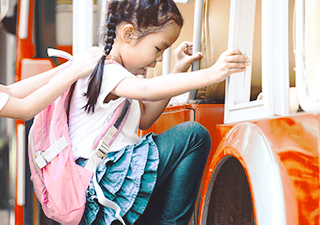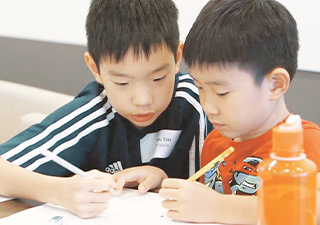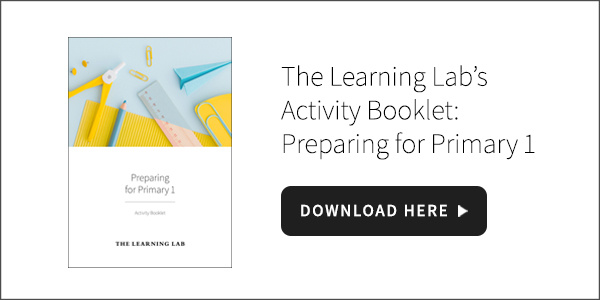
New year, new school, new opportunities for growth! Read our article as we share some tried and true tips for parents and children in the lead up to the first day of primary school.
A Whole New World Awaits
New classmates, new teachers, new school environment — your child’s tiny world is about to get a lot bigger. With these changes come opportunities for personal, social and cognitive growth.
The Countdown And Preparation Begins
In these weeks as you count down to your child’s first day of school, you may be wondering, “What will school be like for my child? Will my child be able to cope in the new environment?”
Parents can help by being proactive — research from professionals at Duke University suggests that establishing a strong communication channel with your child’s teachers helps and so does monitoring changes in your child's behaviour or mood when he or she first starts school.
Whether at home or in school, we’ve got some great tips for every stage of preparation that will help you (and your child) pave a smooth journey towards the new school term in January.
1. Create A Routine That Works
Studies have shown that routines help children feel safe and secure. Set up a routine that works for your child — whether it’s a shower before dinner or an afternoon snack before naptime, it’s important that your child gets into a routine that he or she is comfortable with.
2. Identify Friendly Figures In School
Helping your child identify teachers or staff he or she can go to for assistance is important. When your child recognises trustworthy figures of authority, he or she will feel more secure in the new environment.
Related Article: Gear Up For Primary 1
3. Prepare An 'Emergency' Fund
You may want to consider setting aside an “emergency fund” for your child. Placing extra money in a separate wallet or purse to be kept in his or her school bag means that your child will still have access to money if he or she misplaces pocket money. However, you should set some strict rules about when this money can be used.
4. Test Out That Transport Route
It may be a good idea to have a few dry runs of your child’s journey to and from school to help your child familiarise himself or herself with the route. Help your child identify key landmarks and remember the specific place where he or she will be dropped off or picked up from everyday.
Related Article: Raising A Responsible Child
5. Set Mini Goals To Achieve Together
Help to make the experience seem less daunting by setting mini goals for the first day of school. Start with small tasks like “Leave the house on time” or “Remember to bring my water bottle home” or “Meet one new friend in class today”. These mini goals give your child something to look forward to on his or her first day of school!
Download Our Special Guide To Surviving And Thriving In Primary 1
The Learning Lab would like to extend our help as you and your child are preparing for Primary 1 and the new adventures that lie ahead. Download our fun and informative guide filled with 25 great tips to help your child survive and thrive in Primary 1!
Your child is finally taking his or her first steps towards primary school. (Hurrah!) With new classmates, new teachers and a new learning environment, his or her world is about to get a lot bigger.
This exciting change offers many opportunities for personal, social and cognitive growth.
Getting Ready for the Big Transition from K2 to Primary 1
Between the ages of 0-6, the human brain seeks to create new neural connections — what we call learning. These periods are optimal in building an understanding of symbols, numbers, language, vision and hearing, as well as the development of motor skills, habitual responses, emotional control and social skills.
In primary school, students learn to build a more solid grasp of these skills that will eventually set them up for a positive and balanced life ahead.
You can support your child’s learning process by being proactive. Research from professionals at Duke University suggests establishing strong communication with your child’s teachers and closely monitoring any changes in your child's behaviour or mood when he or she first starts school.
Here are more tips to help you both prepare for this new phase of your child's life.

1. Establish Structure
Dr. Robert Myers, a clinical child and adolescent psychologist, notes that “although predictability can be tiresome for adults, children thrive on repetition and routine”.
This is because young children do not yet have a concept of structure. This early childhood period is an opportune time to introduce new and useful routines. It can be something as simple as preparing his or her own school uniform the night before so it’s ready to be put on in the morning, or finishing up the day’s tasks (i.e. homework) before dinner.
Help your child build good discipline by keeping some of his or her routines consistent, but not rigid.
2. Identify Friendly Figures in School
It is important to encourage your child to identify teachers and or other school staff who can be approached for help, just in case he or she needs assistance while you're not around. These figures can be your child's teachers or even the school nurse or security guard.
Recognising trustworthy figures of authority can make children feel more secure in a new environment, helping them settle in more comfortably and quickly.
Related Article: Gear Up for Primary 1
3. Introduce Your Child to Essential Literacy and Numeracy Skills
On Literacy Skills
Throughout your child's preschool journey, he or she would have learned basic literacy skills such as reading and writing. These skills are essential not just for English, but are also important in building confidence in maths.
Sue Lynn adds, “At the Kindergarten 2 level, being able to read is important. When children can’t read, they won’t be able to follow written instructions and they may also struggle with maths problem sums. Being able to read makes a big, positive difference.”
On Numeracy Skills
A strong number sense sets the foundation for higher-level mathematical thinking at Primary 1. Hence, it's crucial for your child to be given opportunities to explore number concepts that allow him or her to better understand the subject.
Goh Wan Mei, Head of Maths Curriculum at TLL, shares, "Children begin to develop numeracy skills from a very early age. If your child is entering Primary 1 next year, developing a strong maths foundation is going to be crucial — it begins with cultivating a strong number sense."
Download our activity booklet for a series of fun exercises that introduce your child to Primary 1 English and maths in an engaging way.
4. Introduce the Idea of Budgeting, Spending and Saving
Managing an allowance is an inevitable part of your child’s school experience. Introducing your child to the idea of money management is also useful in building his or her numeracy skills.
You can do this by giving your child a bit more than the cost of a school meal so your child understands and gets into the habit of saving. Reinforce the concept of savings by explaining to your child that any money that isn’t spent can be saved for future purposes, like a present for a friend or a toy he or she would like to buy.
These simple actions will not only teach your child financial literacy but also give him or her confidence to start managing his or her own money.
Alternatively, you can give your child just the right amount of money for each day and then pack your child a lunch box. This allows your child to choose between eating the packed food (thereby saving money) or buying food from the canteen. This way, he or she can learn financial restraint while saving towards something.
5. Set Mini Goals to Achieve Together
Make this new experience less daunting for your little one by setting simple goals for the first days of school. These can be expanded on to set the tone for the rest of the academic year.
Start with easier tasks like, “Leave the house on time,” or “Check that your school bag is packed” or even “Label your files for every subject”.
These mini goals help your child to get organised, to be mindful of time and, best of all, to build good habits for the long run.
6. Practise Independence
This may seem intuitive, but as your child has to complete more tasks on his or her own, learning to be independent will go a long way in helping your child feel comfortable in the new environment.
Again, begin with simple tasks that your child will probably have to achieve on his or her own at school.
Encourage your child to dress himself or herself (which will come in handy for Physical Education classes), or tidy his or her room independently (which will help with keeping his or her desk neat at school). These tasks may sound simple, but can be tricky for children, whose motor skills are still developing.
7. Test out Transport Routes

It may be a good idea to have a few dry runs of the journey to and from school to help your child familiarise himself or herself with the route.
Point out key landmarks during the commute and highlight the specific place where he or she will be dropped off or picked up from every day. This will help your child feel more comfortable with the journey, especially if someone else is accompanying him or her in your place.
8. Identify Natural Interests and Curiosities
Children are inherently eager to learn and curious about the world around them — primary school is your golden chance to nurture this love for learning.
By observing what your child naturally gravitates towards, you can begin to introduce related concepts or activities to build on these interests.
For example, if your child loves animals, you can share more about the different characteristics of each animal group, e.g. that mammals are covered in fur or hair while birds are covered in feathers. This is a quick and easy way to show your child that there is more to the topic, plus it gets your child excited about learning too!
9. Introduce Self-Calming Practices
Childhood behaviour can be challenging and a worry to parents when they are not around to give their child guidance or support. One of the biggest worries you may have as a parent could include your child feeling anxious or throwing a tantrum while you're not around.
Self-calming practices can help your child to deal with these emotions gracefully, even in your absence.
You can do this by encouraging your child to communicate his or her emotions in a calm voice despite feeling upset or agitated. Explain to your child that verbalising his or her feelings will help you, or any adult around, address them as quickly as possible. You can also try introducing a stress ball to squeeze during emotionally challenging times.
10. Teach the Value of Personal Space

Children in their preschool years are just learning social behaviours. The concept of personal space is an important part of this, because it allows your child and his or her peers to feel safe and comfortable around each other.
By learning the importance of respecting others' personal space and belongings, it'll help reduce the possibility of your child having conflicts with classmates in school.
This is equally important outside the classroom, as your child may begin interacting more with new friends during co-curricular or after-school activities.
We’re Here to Guide Your Child Through an Enriching Learning Journey
Your child deserves to learn in an engaging environment that helps him or her prepare effectively for Primary 1.
Our programmes will help your child build content knowledge in language and numbers as well as develop key aspects of social development such as communication and confidence.
Registration for our classes is ongoing. We’d love for your child to join us at The Learning Lab and enjoy a fulfilling and enriching journey towards primary school.
The Learning Lab is now at locations. Find a location that suits your needs.
If you have any questions about our range of programmes or class schedules, you may contact us at 6733 8711 or drop us an email at enquiry@thelearninglab.com.sg.



